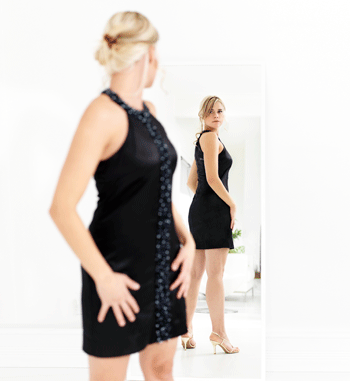Having a strong relationship with ourselves gives us mental and physical tools to help prevent a distorted image of our bodies.
Being part of the marching arts is a wonderful thing—music helps with math skills while marching and participating in guard are good forms of exercise. However, since marching is also an art form, there are at times complicated overlays at play. Being similar in step, playing the same note at the same time and being part of a large group can be difficult and surface ideas about our bodies that are complex and challenging.
Body dysmorphia is a disorder when we see our bodies as imperfect or something we need to hide. Body dysmorphia has undefined causes; however, some have linked it to bullying and abuse taking place at a young age.
Abuse of any kind—physical, sexual, emotional—is a serious matter. If you have experienced any of these, make sure to talk to someone. That person can be a parent, teacher, health professional or counselor. Talking to someone is a wonderful first step to healing and overcoming any kind of abuse.
Sense of Self
At the same time, how we feel about our physical bodies is very strongly linked to our mental image of ourselves. We need to develop a healthy relationship with ourselves first and foremost.
Developing a morning routine can set you up for success throughout the day. The routine does not have to be long, just something to ensure that you get out of bed on the right foot.
Power Posing
Also, “power posing,” such as standing with your feet apart and your hands on your hips in a “Wonder Woman” pose, has been shown to increase testosterone, reduce cortisol—the stress hormone— and produce an overall sense of calm in the mind and body. Social psychologist Amy Cuddy talks about this in her Ted Talk titled, “Your Body Language Shapes Who You Are.”
Finding time to meditate and take time for ourselves in general is also a huge factor. When we give value and weight to the time we spend on ourselves, like we would for rehearsal and practice or a meeting, we begin to get a leg up on how we see ourselves externally.
Nurturing Our Bodies
Taking time to prepare our own food and eating warm unctuous foods, such as oatmeal and avocados—especially in the winter—help balance our bodies. These types of foods also allow us to feel full and nurture our basic functions.
When we feel good and healthy about ourselves, then we are less susceptible to delving into the trap of body dysmorphia.
If you have body dysmorphia or suffered some type of abuse, please make sure to seek out a medical professional immediately as well as law enforcement if a law has been broken. They are there to help you get back on track and back in good health.


